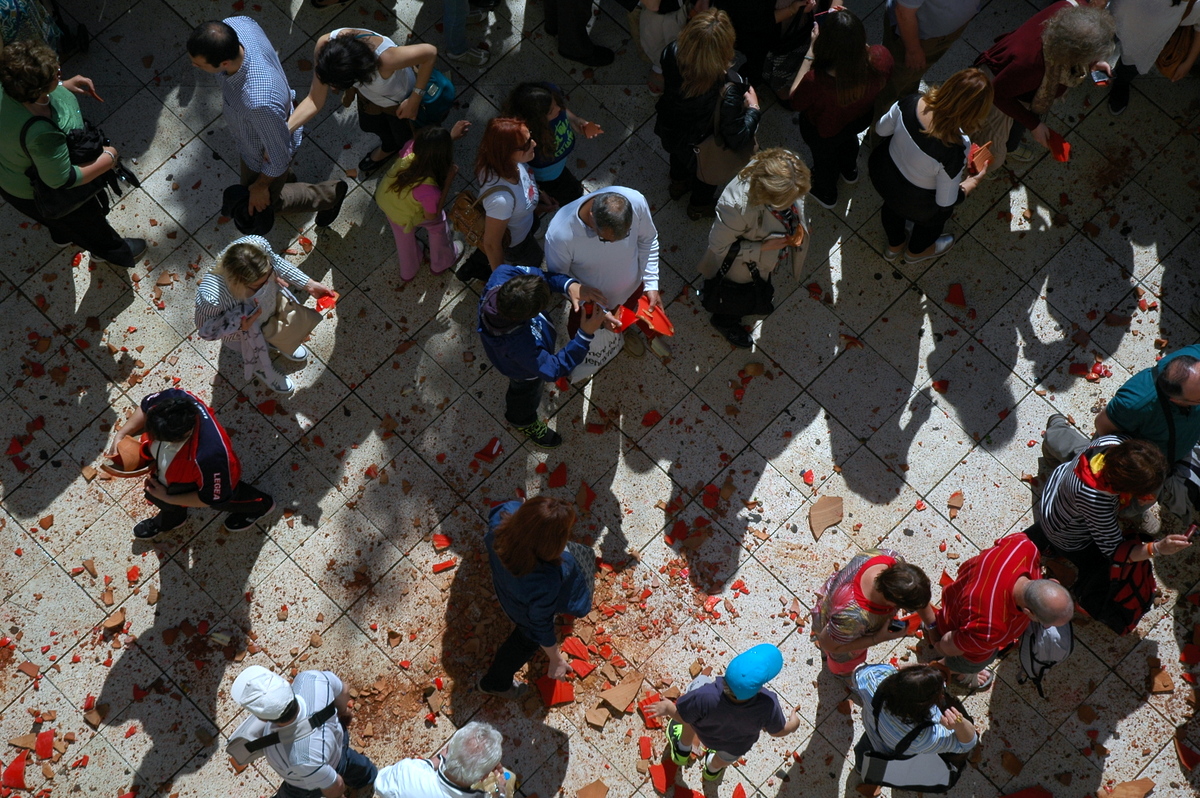


On Holy Saturday, at 6 a.m. in the morning, the custom of 'the earthquake' is carried out at the Church of the Blessed Virgin of Strangers. This is a re-enactment of the earthquake which took place after the Resurrection, as described in the Bible. Later, at 9 a.m., the procession of Saint Spiridon, which was consecrated in 1550 when the Saint saved the island from famine, takes place. The Saint shares the stage with the Epitaphios of his own church, a custom which was established during Venetian times when, for reasons of security, epitaphios processions were forbidden, whereas the procession of the Saint was permitted to take place. The accompanying orchestras play Michelli's 'Calde Lacrime', Faccio's "Hamlet' and Beethoven's Funeral March.
At 11 a.m. the First Resurrection and the 'Pot Throwing' custom take place, and the local people throw pots out of their windows, smashing them onto the streets below. This noisy custom, originating with the Venetians, began in the town and spread to the villages. The Venetians used to throw all their old and useless objects out of the window on January 1st each year, so that the New Year might bring them new ones. The Corfiots adopted this custom and moved it to their great Easter celebration. Nowadays, instead of throwing out old crockery, the people use big, specially made pots (called a 'botis'), filled with water to make a louder crash. Another explanation for the custom gives it a pagan provenance. At Easter, nature starts its new year and re-awakens after winter. The fruits are collected in new receptacles, throwing out the old ones. After the breaking of the pots, the philharmonic orchestras tour the streets playing joyful songs. At Pinia, the old commercial centre of the town, the custom of the 'mastelas' (washtub) has been revived. A half-barrel decorated with myrtle and ribbons is filled with water, and passers-by are invited to throw coins into it for good luck. When the first bell sounds for the Resurrection, someone jumps into the barrel and collects up the money. In old times the diver was not a volunteer but an unsuspecting passer-by, thrown in against his will.
In Paxos, a unique and traditional 'First Resurrection' ceremony takes place at Agios Iakovas at Fountana, where with the first chant of 'Christ is Risen' the congregation beats the pews rhythmically, while outside chaos reigns, with gunfire, firecrackers and fireworks. In the villages in general, after the First Resurrection, the pascal lambs are slaughtered and their blood is used to paint a cross on the door lintels.
On Holy Saturday evening, before the Orthodox ceremony takes place, you may attend the Catholic service at the Duomo Cathedral. With the participation of all Church officials, the Resurrection service finishes here at 11 pm, to permit the clergy time to prepare themselves for the Orthodox service. All over Greece the ceremony takes place on a platform outside the church. In some Corfiot villages , indeed, it is the custom to close the doors of the church, and with the cry of "Christ is Risen' (Christos Anesti) the priest, having made three circuits of the church while chanting, kicks open the central door and enters, singing the psalm 'Enter,enter by the Grace of God'. In Corfu Town, the service is held in the Upper Esplanade Square, starting at the Church of Agia Paraskevi, with the participation of the Bishop, the philharmonic orchestras, and thousands of people. The Resurrection is seen in with a roll of drums and an impressive firework display, and when this ends the bands traverse the streets of the town at a great pace playing cheerful music, with people running behind them singing. The party has only just begun, and will last until dawn. The Resurrection is celebrated and the Lenten fast is broken with chilihourda (the local Easter soup), red eggs, fogatsa (brioche), columbines (a special bread of Venetian origin, baked in the form of a dove) and of course lots of wine. "Good evening brothers and sisters , the season's greetings. Lent which lasted seven weeks is over. Lent, when we were sad, is over, and now all the world is joyful because Christ is risen, and Christians everywhere are glad". This is from an Easter carol, which children would sing late on Holy Saturday evening.